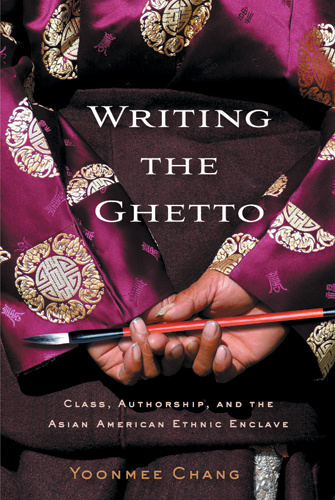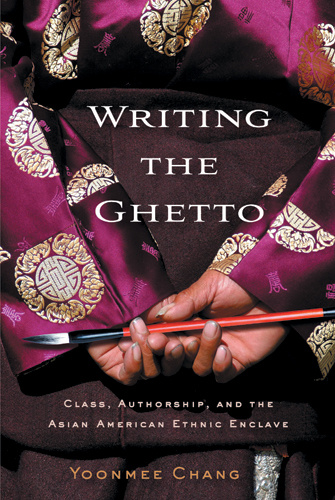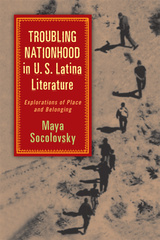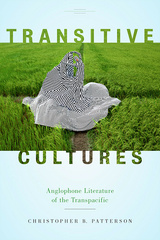Our shopping cart is currently down. To place an order, please contact our distributor, UTP Distribution, directly at utpbooks@utpress.utoronto.ca.

208 pages, 6 x 9
2 illustrations.
Paperback
Release Date:02 Nov 2011
ISBN:9780813551753
Hardcover
Release Date:08 Nov 2010
ISBN:9780813548012
Writing the Ghetto
Class, Authorship, and the Asian American Ethnic Enclave
Rutgers University Press
In the United States, perhaps no minority group is considered as "model" or successful as the Asian American community. Rather than living in ominous "ghettoes," Asian Americans are described as residing in positive-sounding "ethnic enclaves." Writing the Ghetto helps clarify the hidden or unspoken class inequalities faced by Asian Americans, while insightfully analyzing the effect such notions have had on their literary voices.
Yoonmee Chang examines the class structure of Chinatowns, Koreatowns, Little Tokyos, and Little Indias, arguing that ghettoization in these spaces is disguised. She maintains that Asian American literature both contributes to and challenges this masking through its marginalization by what she calls the "ethnographic imperative." Chang discusses texts from the late nineteenth century to the present, including those of Sui Sin Far, Winnifred Eaton, Monica Sone, Fae Myenne Ng, Chang-rae Lee, S. Mitra Kalita, and Nam Le. These texts are situated in the contexts of the Chinese Exclusion Era, Japanese American internment during World War II, the globalization of Chinatown in the late twentieth century, the Vietnam War, the 1992 Los Angeles riots, and the contemporary emergence of the "ethnoburb."
Yoonmee Chang examines the class structure of Chinatowns, Koreatowns, Little Tokyos, and Little Indias, arguing that ghettoization in these spaces is disguised. She maintains that Asian American literature both contributes to and challenges this masking through its marginalization by what she calls the "ethnographic imperative." Chang discusses texts from the late nineteenth century to the present, including those of Sui Sin Far, Winnifred Eaton, Monica Sone, Fae Myenne Ng, Chang-rae Lee, S. Mitra Kalita, and Nam Le. These texts are situated in the contexts of the Chinese Exclusion Era, Japanese American internment during World War II, the globalization of Chinatown in the late twentieth century, the Vietnam War, the 1992 Los Angeles riots, and the contemporary emergence of the "ethnoburb."
Chang's excellent book makes a compelling case for why Asian American critics need to use the 'ghetto' as a paradigm and marshals ample evidence to show the ways Asian American literature supports such a provocative claim.
Yoonmee Chang's elegantly written, deftly argued, and meticulously developed Writing the Ghetto makes a valuable contribution to our understanding and appreciation of Asian American social history and literature. This is an important book.
Chang's argument is nuanced, provocatively counterintuitive, and occasionally dizzying. Writing the Ghetto is an important text not only for Asian American scholars, but for American and ethnic studies scholars interested in interrogating the politics, economics, and ethics of belonging.
Chang's excellent book makes a compelling case for why Asian American critics need to use the 'ghetto' as a paradigm and marshals ample evidence to show the ways Asian American literature supports such a provocative claim.
Yoonmee Chang's elegantly written, deftly argued, and meticulously developed Writing the Ghetto makes a valuable contribution to our understanding and appreciation of Asian American social history and literature. This is an important book.
Chang's argument is nuanced, provocatively counterintuitive, and occasionally dizzying. Writing the Ghetto is an important text not only for Asian American scholars, but for American and ethnic studies scholars interested in interrogating the politics, economics, and ethics of belonging.
Yoonmee Chang is an associate professor of English and an affiliate of cultural studies at George Mason University.
1 Introduction: The Asian American Ghetto 1
2 “Like a Slum”: Ghettos and Ethnic Enclaves, Ghetto and Genre 25
3 The Japanese American Internment: Master Narratives and Class Critique 70
4 Chinese Suicide: Political Desire and Queer Exogamy 111
5 Ethnic Entrepreneurs: Korean American Spies, Shopkeepers, and the 1992 Los Angeles Riots 135
6 Indian Edison: The Ethnoburbian Paradox and Corrective Ethnography 176
Conclusion: The Postracial Aesthetic and Class Visibility 201
2 “Like a Slum”: Ghettos and Ethnic Enclaves, Ghetto and Genre 25
3 The Japanese American Internment: Master Narratives and Class Critique 70
4 Chinese Suicide: Political Desire and Queer Exogamy 111
5 Ethnic Entrepreneurs: Korean American Spies, Shopkeepers, and the 1992 Los Angeles Riots 135
6 Indian Edison: The Ethnoburbian Paradox and Corrective Ethnography 176
Conclusion: The Postracial Aesthetic and Class Visibility 201






